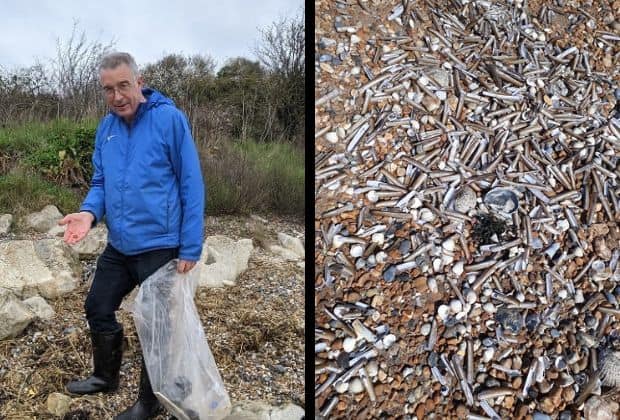
Thousands of razor clam shells have washed ashore from Sandwich Bay to Pegwell.
Thanet Coastal Warden Tony Ovenden came across the marine creatures this morning (June 7) and says the discovery indicates a mass death.
Tony said: “The area I looked at today was the northern end of Sandwich Bay into Pegwell Bay. I have no idea how many shells are ashore towards Deal. We could be looking at hundreds of thousands from Deal to Pegwell Bay.
“The shells are sparse in some places and denser in the cusps in the shingle. I have taken a GPS reading from where I started and finished short of the nature reserve boundary.”
There are reports of the razor clams also washing up at Minnis and Epple bays.
Razor shells or razor clams have long, narrow clam shells. They are a burrowing species and live buried in the sand around the low tide mark and on the seabed out to around 60m deep.
They dig themselves into the sand using their strong muscular “foot”. Razor clams filter feed on plankton and detritus and quite often, the 2 small siphons are all that is visible.
After storms, huge numbers of razor clam shells often wash up on beaches. In Scotland, they are called spoots – named after the jet of water they shoot out when burrowing at low tide.
Razor clams, of which there are three species, have a lifespan of some ten years.
It is reported that mass deaths have been attributed to storms and “adverse environmental conditions.” Another theory is attack from starfish which feed on the razor clams.
Tony Child, from the Thanet Coast Project, said: “We do get occasions when shells get washed ashore – it is not that unusual. They are very sensitive to minor changes, such as increase/decrease temperature or higher to lower salinity – salt is used to make them come out of their burrows for instance – or stormy weather causes sand movements off shore that may expose them. Quite often we see also them washed ashore in the Epple -Westgate shoreline.”

